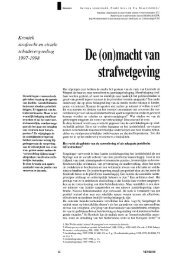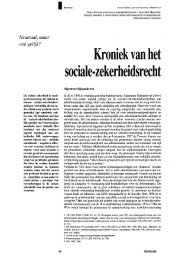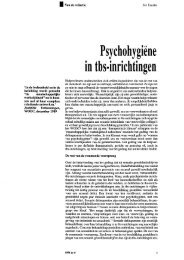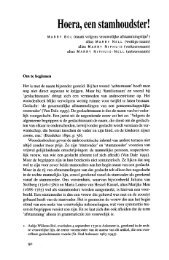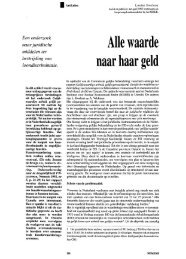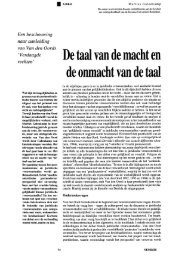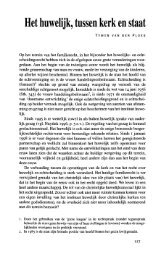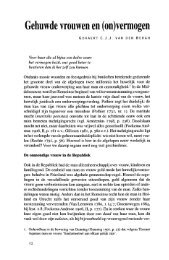(2003) nummer 3 mei/juni - Nemesis
(2003) nummer 3 mei/juni - Nemesis
(2003) nummer 3 mei/juni - Nemesis
Create successful ePaper yourself
Turn your PDF publications into a flip-book with our unique Google optimized e-Paper software.
pretations of affirmative action or positive<br />
action are clearly inspired by formal<br />
and symmetrical approaches to<br />
equality. Under such approaches TSMs<br />
often appear as some soit of exception<br />
to (or derogation from) the non-discrimination<br />
norm. 17 In contrast, the GR<br />
should explain that TSMs are indeed<br />
part of this norm. Instead of a purely individualistic<br />
and formal approach, the<br />
CEDAW-Convention underlines the<br />
context of the societal problems that<br />
groups of women experience trying to<br />
realise their fundamental human rights.<br />
The Convention gives an important<br />
place to TSMs, regarding such measures<br />
as one of the means to realise<br />
equality of men and women, and not<br />
merely as an exception to the principle<br />
of equality.<br />
VI The meaning of the concept of<br />
TSMs in the CEDAW Convention<br />
The participants of the expert meeting<br />
believe that the main objective of<br />
TSMs is to accelerate the process of<br />
equal participation of women in all<br />
fields ofsocial, economie, political and<br />
cultural life and/or the process of redistribution<br />
of power and resources<br />
and the bringing about of social and<br />
cultural change that will improve the<br />
de facto position of women. (Paragraph<br />
II, 6 and 8 of this Report.) The GR<br />
should clearly state that mechanisms<br />
and instruments that fall within the<br />
scope of Article 4(1) are directed exclusively<br />
at women (or a specific group<br />
of women), and thus generally exclude<br />
men. This aspect makes TSMs potentially<br />
contestable and demonstrates<br />
why Article 4(1) is needed in some cases<br />
to defend such measures against the<br />
claim that (some) men are being discriminated<br />
against. As stated above<br />
(Paragraph II, 10) such a claim can only<br />
be sustained when a serious infringement<br />
of the fundamental rights of<br />
(some) men is at stake.<br />
Two elements are crucial to the concept<br />
of a TSM. First there is the element<br />
of equal participation of women<br />
in fields where women are under-represented<br />
(labour, education, healthcare,<br />
sports, politics, et cetera). Access to<br />
these fields should be improved, and<br />
the needs of women should be accommodated<br />
in such a way that fhey can remain<br />
(and participate) in those positions<br />
to which they have gained acces s.<br />
The mechanism of TSMs is not only<br />
about opening doors, it is also about<br />
making it possible for women to function<br />
behind those doors. Second is the<br />
element of redistribution of power and<br />
WETGEVING<br />
resources (economie resources, positions<br />
of power, et cetera).<br />
Both elements demand that concrete<br />
targets and instruments must be set in<br />
TSM-plans regarding how many<br />
women should participate in a certain<br />
field, how the participation of women<br />
should be accommodated or facilitated,<br />
how women will be empowered and<br />
whatpart of the resources should be redistributed<br />
to women. In fields where<br />
participation and redistribution are not<br />
at stake TSMs might not be the adequate<br />
tooi to put an end to discrimination<br />
of women.<br />
In addition, in this Section the GR<br />
should clarify the meaning of Article<br />
4(1) with special regard for the term<br />
TSM itself: (1) Temporary (2) Special<br />
and (3) Measures.<br />
Temporary means that the measures<br />
are not deemed to be necessary on a<br />
permanent basis. They aim at achieving<br />
particular concrete results in response<br />
to certain concrete problems.<br />
Once the desired result has been<br />
reached, the measure can (and must) be<br />
abolished. The result can be described<br />
in terms of a certain redistribution of<br />
power or of resources or of a certain degree<br />
of participation of women. However,<br />
temporary need not mean 'short<br />
term'; some TSMs may stretch over<br />
quite a long time. Additionally, TSMs<br />
might be used to initiate pilot projects<br />
or policy schemes with a permanent<br />
character. The time during which a<br />
TSM is valid can be set in various way s<br />
(by specifying a date or by meeting certain<br />
criteria or goals). In all reports in<br />
which a State presents TSMs, the government<br />
should justify why these measures<br />
are temporary and how it plans to<br />
evaluate whether the specific goals of<br />
the measures have been achieved pursuant<br />
to which the measures can then<br />
be abolished.<br />
Special is a term that is problematic in<br />
the sense that it may suggest that<br />
women are somehow deviant, undeserving<br />
or belonging to a category that<br />
needs special measures to be able to<br />
participate or compete in the 'otherwise<br />
normal' society. But, the only<br />
things special about these measures are<br />
that they are directed exclusively at<br />
women and that they serve a special<br />
goal! The context of each TSM is crucial<br />
in order to evaluate the 'special'<br />
character thereof, as this context determines<br />
whether a TSM is appropriate<br />
and necessary to achieve the specific<br />
goal that is set in a specific situation.<br />
Measures encompass a great variety of<br />
forms, ranging from outreach pro-<br />
grams, to targeted hiring and to quota<br />
systems. The choice of a particular type<br />
of measure depends on the nature of<br />
the problems at hand, the context in<br />
which the program has to function and<br />
the specific targets that are set in the<br />
program. The GR should make clear<br />
that measures should always be appropriate<br />
and necessary in the light of the<br />
general goal of article 4(1), i.e. accelerating<br />
the improvement of the de facto<br />
position of women.<br />
VII The mandatory nature of TSMs<br />
The GR should make clear that States<br />
have a positive obligation to improve<br />
the position of women. This includes<br />
the abolition of discriminatory legislation<br />
and practices, the enactment of anti-discrimination<br />
legislation (including<br />
legislation that covers the private sector)<br />
and the removal of structural barriers.<br />
In each case States do have a broad<br />
choice of means. They can determine<br />
for themselves what to deem appropriate<br />
given the specific circumstances.<br />
However, States do not have the choice<br />
to remain inactive. The Convention requires<br />
States to explain what tools and<br />
mechanisms they have chosen to reach<br />
the overall aims of the Convention. The<br />
term appropriate requires that States<br />
justify their choice of means on the basis<br />
of verifiable research.<br />
The mandatory nature of TSMs flows<br />
from the combined reading of the Articles<br />
1-5 and 24 18 in which States are required<br />
to take all appropriate and necessary<br />
measures to effectively put an<br />
end to all forms of discrimination<br />
against women. The mandatory nature<br />
of TSMs is also expressed in the Articles<br />
(6-16) that require that States shall<br />
take all appropriate measures. TSMs<br />
can provide the appropriate and necessary<br />
mechanisms to accelerate the improvement<br />
of the de facto position of<br />
women. In so f ar as they can bring<br />
about this result and this result cannot<br />
be achieved otherwise, i.e. is necessary,<br />
they are also mandatory.<br />
Whether a TSM is appropriate and<br />
necessary in a specific situation should<br />
be determined according to the facts<br />
and circumstances of that situation.<br />
States cannot refrain from enacting<br />
TSMs solely on the ground that they<br />
do not consider measures that are<br />
aimed exclusively at women to be appropriate<br />
at all. Article 4(1) of the Con-<br />
. vention makes it clear that such measures<br />
can indeed be appropriate and<br />
necessary.<br />
Additionally, in this Section the GR<br />
should also clarify that States cannot<br />
40 NEMESIS <strong>2003</strong> nr. 3



